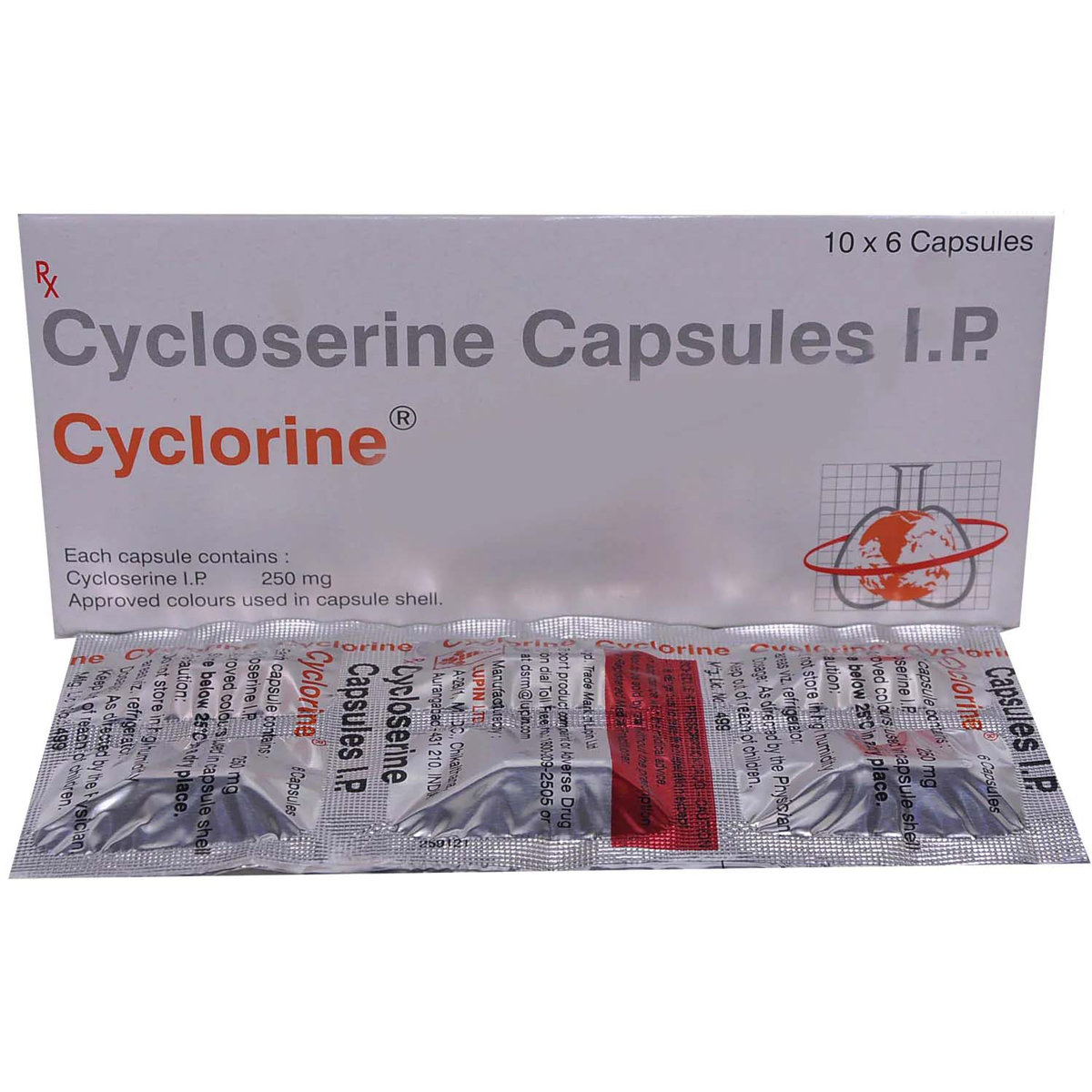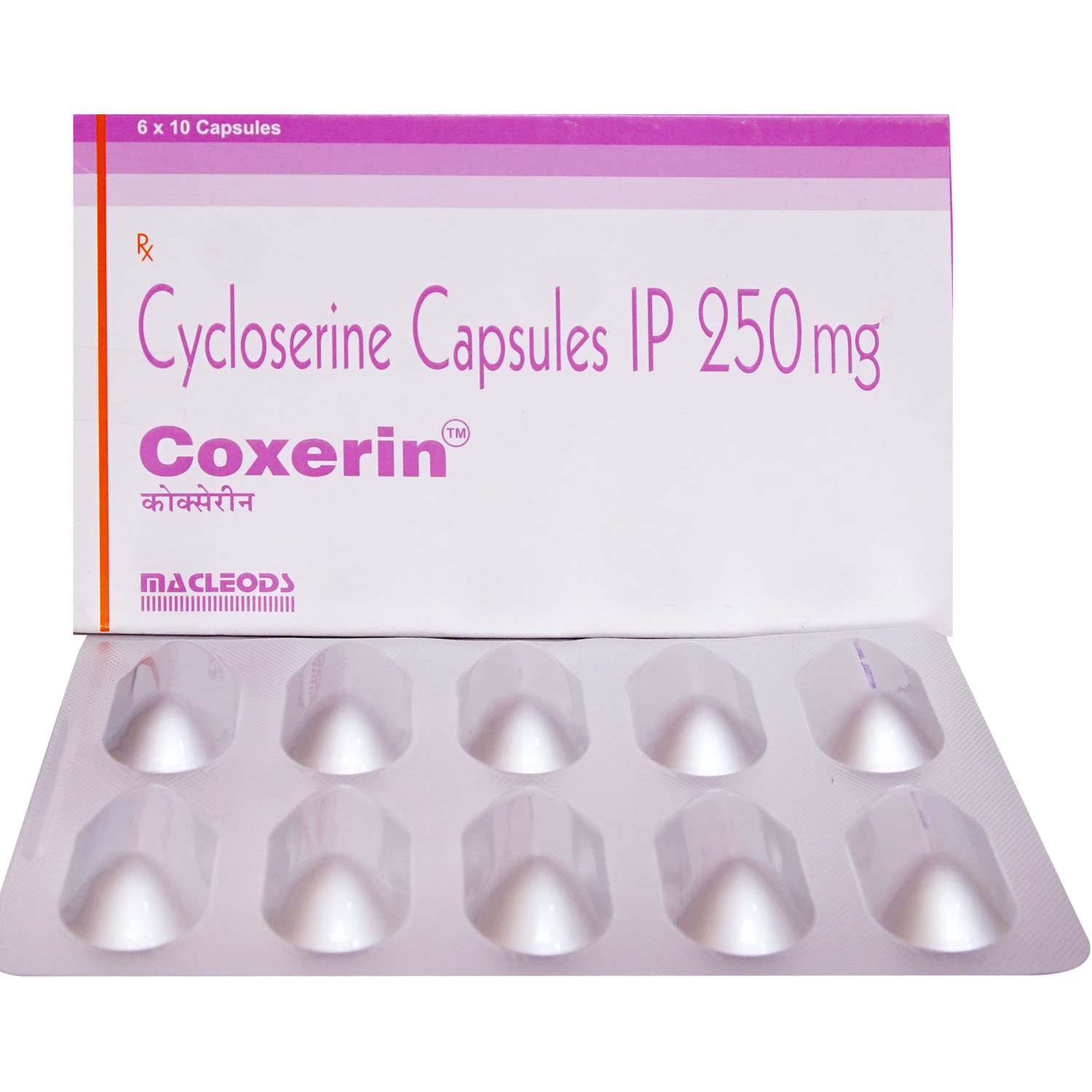Cycloserine
About Cycloserine
Cycloserine belongs to the group of medicines called antibiotic drugs primarily used to treat tuberculosis. It is also used to treat kidney infections. Tuberculosis is an infectious disease that mainly affects the lungs. Cycloserine should not be used alone and must be given in combination with other tuberculosis medications. Cycloserine does not work against infections caused by the virus, including cold and flu.
Cycloserine consists of a medicine called 'Cycloserine' that works by inhibiting bacteria's cell-wall biosynthesis in susceptible strains of bacteria that causes tuberculosis (Mycobacterium tuberculosis).
Cycloserine should be taken as prescribed by the doctor. The dose and duration of Cycloserine can vary depending on your condition and the severity of the infection. Sometimes, you may experience certain common side effects, such as dizziness, drowsiness, mood changes, headache, numbness, and tingling. Most of these side effects do not require medical attention and will resolve gradually over time. However, you are advised to talk to your doctor if you experience these side effects persistently.
Do not stop taking Cycloserine despite symptomatic relief. Treat your condition effectually, and continue taking Cycloserine for as long as it has been prescribed. Do not take Cycloserine if you have a seizure disorder, severe kidney disease, depression, anxiety or mental illness. Also, do not take Cycloserine if you are an alcoholic. Consult your doctor before taking Cycloserine if you are pregnant. Avoid breastfeeding while taking Cycloserine as it passes into breast milk. Cycloserine may cause dizziness and mood changes, so drive with caution if you experience these signs. Avoid consuming alcohol with Cycloserine as it might increase your risk of seizures. Inform your doctor immediately if you experience/notice confusion, seizure, or trouble speaking after taking Cycloserine.
Uses of Cycloserine
Medicinal Benefits
Cycloserine contains 'Cycloserine' that works by inhibiting bacteria's cell-wall biosynthesis in susceptible strains of bacteria that causes tuberculosis (Mycobacterium tuberculosis).
Directions for Use
Storage
Side Effects of Cycloserine
- Confusion
- Restlessness
- Drowsiness
- Vertigo
- Cardiac arrhythmia
- Folate deficiency
- Hyperreflexia
- Dysarthria
- Dizziness
- Headache
- Coma
- Liver enzymes increased
- Somnolence
- Paresis
- Seizure
- Heart failure
Drug Warnings
Before starting Cycloserine, please inform your doctor if you have a history of seizure disorder and kidney problems. Consult your doctor before taking Cycloserine if you are pregnant. Avoid breastfeeding while taking Cycloserine as it passes into breast milk. Cycloserine may cause dizziness, drowsiness or mood changes, so drive cautiously. Avoid consuming alcohol with Cycloserine as it might increase the risk of seizures. Before taking Cycloserine, inform your doctor if you are already taking medicines like ethionamide or isoniazid. Seek medical help immediately if you notice overactive reflexes, tremors or shaking, rapid weight gain, severe drowsiness, dizziness or spinning sensation while on this medication.
Drug Interactions
Drug-Drug Interactions: Cycloserine may interact with medicines used to treat allergy (such as cetirizine, diphenhydramine), medications for sleep or anxiety (such as alprazolam, zolpidem), muscle relaxants and opioid pain relievers (such as codeine) and other medicines used to treat TB (ethionamide, isoniazid).
Food-Drug Interactions: Do not consume alcohol while taking Cycloserine as it might increase the risk of seizures.
Drug-Disease Interactions: Cycloserine may interact with liver/kidney disease, seizure disorder, or mental/mood disorder.
Drug-Drug Interactions Checker List:
Safety Advice

Alcohol
unsafeAvoid alcohol consumption while taking Cycloserine as it could lead to increased dizziness or increase the risk of seizures.

Pregnancy
cautionPregnancy Category C: There are no adequate and well-controlled studies in pregnant women. It is unknown whether Cycloserine can cause fetal harm when administered to a pregnant woman. Cycloserine should be used only when clearly needed. Discuss the risks and benefits with your doctor.

Breast Feeding
unsafeCycloserine may pass into breast milk. Consult your doctor before breast-feeding.

Driving
unsafeCycloserine may cause dizziness, mood changes, numbness and tingling sensation in hands and feet. Do not drive or operate machinery if you experience these symptoms.

Liver
cautionDose adjustment may be needed. Please consult your doctor if you have any concerns regarding this.

Kidney
unsafeDo not use the Cycloserine if you have severe kidney disease. Please consult your doctor if you have any concerns regarding this.

Children
unsafeDo not use Cycloserine in children younger than 18 years old.
Habit Forming
Diet & Lifestyle Advise
- Pineapple juice might help soothe the symptoms of cough and cold. It also has anti-inflammatory and mucolytic properties.
- Foods rich in vitamin C, such as kiwi, broccoli and bell pepper, help improve the immune system.
- Avoid processed and fried foods.
- Warm ginger tea or warm soup can help relieve a cough.
- Avoid foods and drinks containing histamine or tyramine, such as cured meat, matured cheese, soya, tuna, salmon, mackerel, wine and beer.
- To help prevent certain side effects (such as nerve problems) from this medication, your doctor may advise you to take vitamin B6 (pyridoxine).
- Quit smoking and avoid alcohol consumption.
Special Advise
- You may need frequent blood tests to check your kidney and liver function.
- Cycloserine may cause live bacterial vaccines (such as typhoid) not to work. Do not have any immunization/vaccinations while using this medication unless your doctor tells you to.
Patients Concern
Disease/Condition Glossary
Tuberculosis (TB): Tuberculosis is an infectious disease that affects the lungs, but it can also spread to other body parts such as kidneys, brain, spine and bone marrow. Tuberculosis is caused by a bacteria named Mycobacterium tuberculosis. It is a contagious disease that can spread to others through small droplets released into the air by a person suffering from tuberculosis. Symptoms include a cough that lasts for a few weeks, pain while coughing or normal breathing, unexplained fatigue, fever, night sweats, and loss of appetite and weight. People who smoke or consume alcohol, people diagnosed with HIV, and immune system problems are more likely at risk of developing active TB.
FAQs
Cycloserine is a broad-spectrum antibiotic, which may be bacteriostatic or bactericidal. It works by blocking peptidoglycan's formation (a substance important for forming the cell walls of bacteria). Eventually, the walls of the bacteria become weak and lead to the death of the bacteria.
Do not stop taking Cycloserine despite symptomatic relief. Treat your condition effectually, continue taking Cycloserine for as long as it has been prescribed for you.
Cycloserine might decrease the effectiveness of oral contraceptives (birth control pills). This could lead to an unplanned pregnancy. Instead, use a reliable barrier method of contraception such as condoms or the coil while taking Cycloserine. Consult your doctor if you have any concerns regarding this, your doctor may suggest an alternate contraception method.
After taking Cycloserine, one may rarely experience mood changes like confusion, depressed mood, unusual thoughts or behaviour. Inform your doctor right away if you notice/experience any of these symptoms.
Cycloserine might interfere with live bacterial vaccines and cause them not to work as well. Do not have any immunizations /vaccinations while on this medication unless you say to.
Cycloserine has been associated in a few instances with vitamin B12 and/or folic acid deficiency, megaloblastic anaemia and sideroblastic anaemia. Consult your doctor for further advice.






